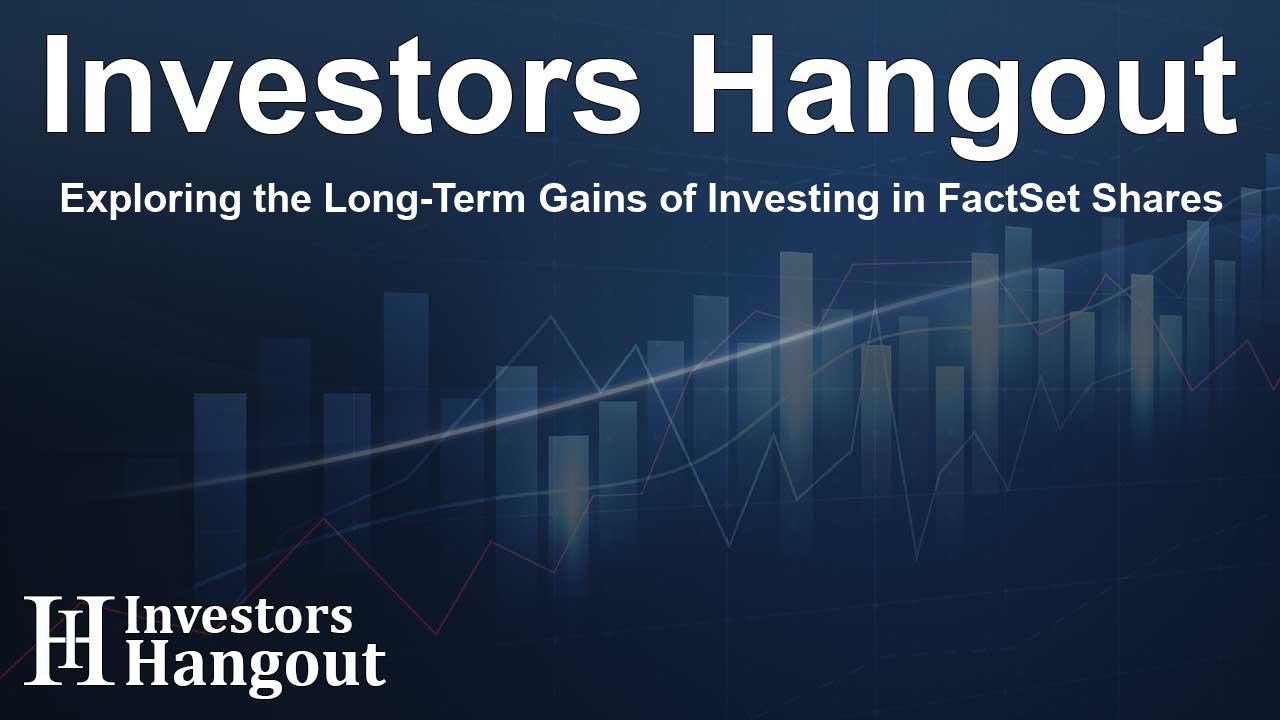Exploring the Long-Term Gains of Investing in FactSet Shares

Understanding the Historical Performance of FactSet
FactSet Research Systems (NYSE: FDS) has demonstrated a robust performance in the stock market over the past two decades. With an average annual return of 11.32%, it has consistently outpaced the market by 2.23% annually. At present, the company's market capitalization stands impressively at $10.85 billion, which signifies its status in the financial analytics industry.
The Impact of Long-Term Investment
For those who invested $1,000 in FDS stock two decades ago, the investment would now have grown substantially. Today's valuation indicates that this initial amount would be approximately $8,506.01, based on the current share price of $285.29. Such figures highlight the power of compound returns and the significant advantage of holding investments over extended periods.
Key Insights into FactSet's Growth
It's fascinating to note how much growth can accumulate through compounded returns. The exponential rise of investment values stresses the importance of patience and long-term strategy in equity markets. Investors who held their shares could have seen their investments multiply due to the stability and growth potential of FactSet.
Why Choose FactSet?
Investing in FactSet offers more than just impressive returns. The company's commitment to providing robust financial data and analytics solutions has made it an essential player in the market. Businesses and financial professionals rely on FactSet for accurate and comprehensive information, thus fueling further demand for its services.
What Lies Ahead for FactSet?
The future of FactSet remains promising with ongoing innovations and expansions in their offerings. As industries move towards increased digitization and data analysis, FactSet continues to position itself as a leader. Their ongoing improvements in technology and service delivery assure investors of sustained growth potential.
Frequently Asked Questions
What does it mean for an investor to see an 11.32% annual return?
An 11.32% annual return indicates that, on average, investors in FactSet can expect their investment value to increase by that percentage each year, demonstrating strong performance over time.
How does compounded growth affect investments?
Compounded growth allows investors to earn returns on their initial investment and on the returns earned previously, creating a snowball effect that significantly increases investment value over time.
What are the current market trends affecting FactSet?
Current market trends suggest a growing demand for financial analytics and data solutions. FactSet's ability to adapt and innovate in this changing landscape enhances its investment appeal.
Why should I consider long-term investments?
Long-term investments, such as those in FactSet, generally provide more stable returns and reduce the risk associated with market volatility, making them a safer strategy for wealth accumulation.
How do I invest in FactSet Research Systems stock?
Investing in FactSet can be done through a stock brokerage or a financial advisor. Investors can purchase shares directly or through investment funds that hold FDS shares.
About The Author
Contact Kelly Martin privately here. Or send an email with ATTN: Kelly Martin as the subject to contact@investorshangout.com.
About Investors Hangout
Investors Hangout is a leading online stock forum for financial discussion and learning, offering a wide range of free tools and resources. It draws in traders of all levels, who exchange market knowledge, investigate trading tactics, and keep an eye on industry developments in real time. Featuring financial articles, stock message boards, quotes, charts, company profiles, and live news updates. Through cooperative learning and a wealth of informational resources, it helps users from novices creating their first portfolios to experts honing their techniques. Join Investors Hangout today: https://investorshangout.com/
The content of this article is based on factual, publicly available information and does not represent legal, financial, or investment advice. Investors Hangout does not offer financial advice, and the author is not a licensed financial advisor. Consult a qualified advisor before making any financial or investment decisions based on this article. This article should not be considered advice to purchase, sell, or hold any securities or other investments. If any of the material provided here is inaccurate, please contact us for corrections.
